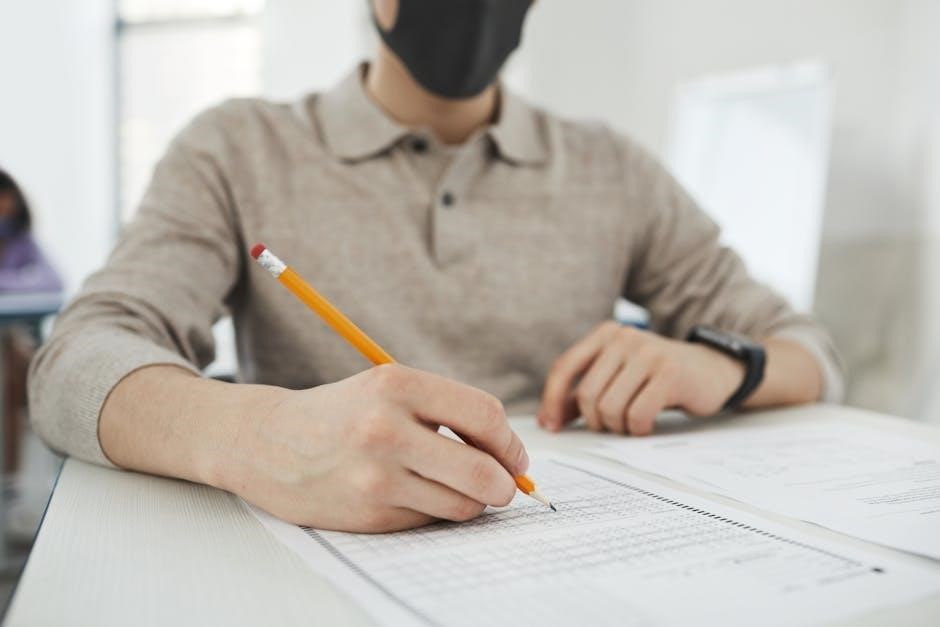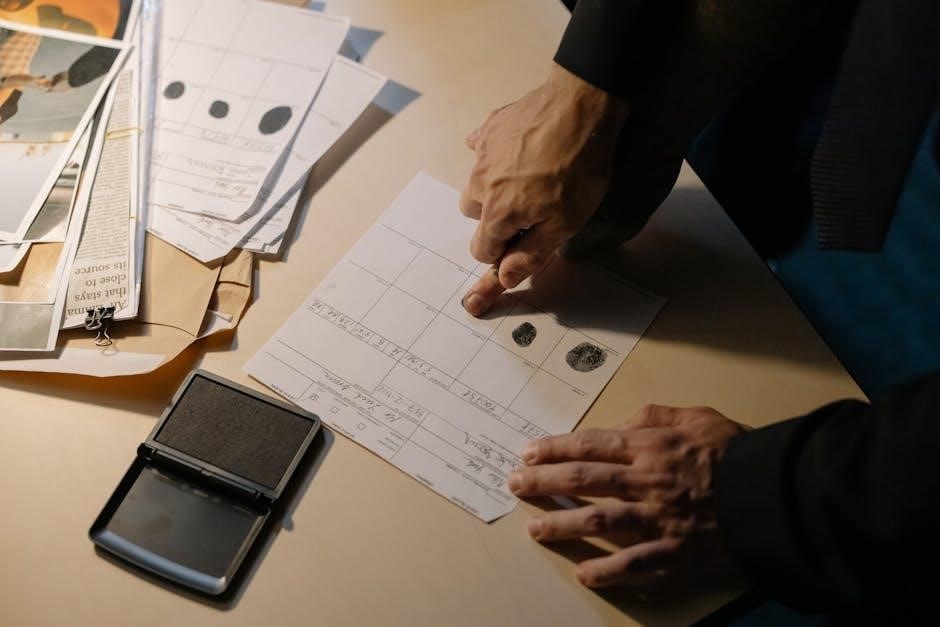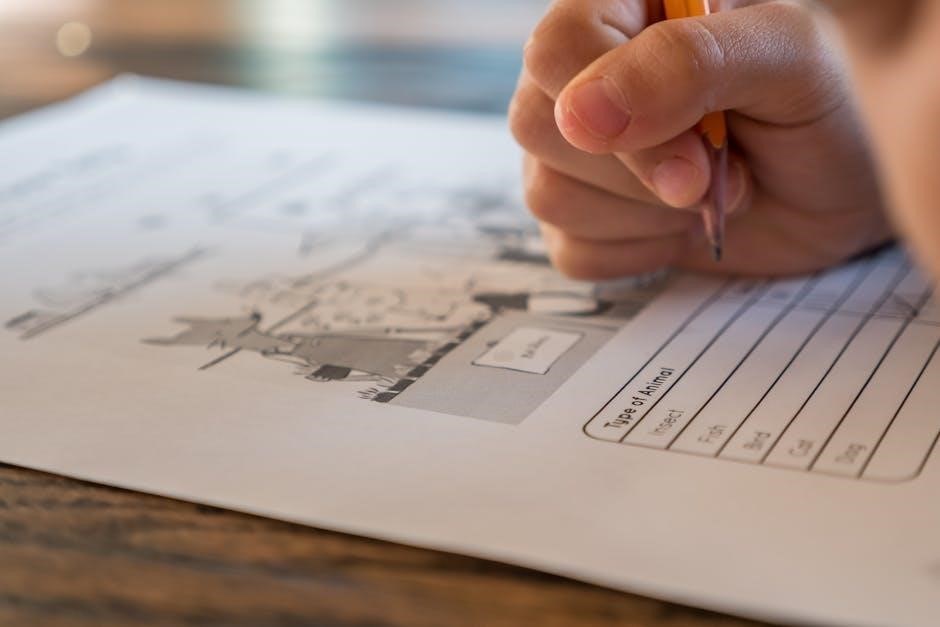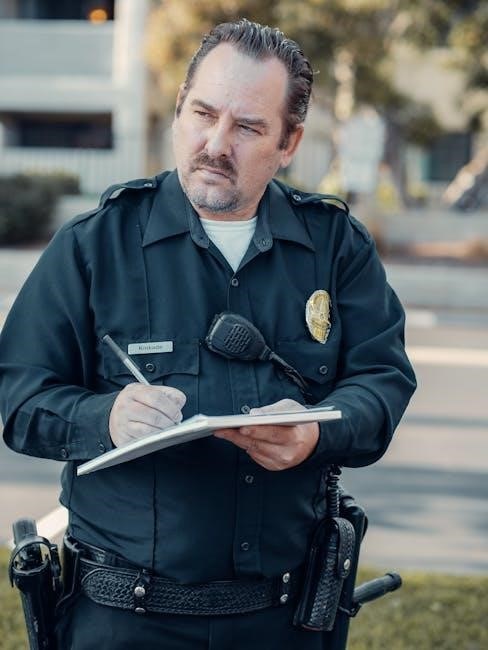This guide provides comprehensive preparation strategies for the police officer selection test, covering written exams, physical ability tests, oral interviews, and psychological evaluations to ensure success.
The Police Officer Selection Test (POST) is a comprehensive evaluation designed to assess candidates’ skills, abilities, and suitability for a career in law enforcement. It typically includes a written exam, physical ability test, oral interview, and psychological evaluation. The written exam focuses on math, reading comprehension, language skills, and logical reasoning. Preparation is crucial, as the test measures both cognitive and physical capabilities. This guide provides detailed insights into each section, offering strategies and tips to help candidates excel. Understanding the test structure and content is the first step toward achieving success and becoming a qualified police officer.
Understanding the Importance of Preparation
Preparation is critical for success in the Police Officer Selection Test, as it is a highly competitive process. Candidates must dedicate time to studying and practicing to ensure they meet the required standards. The test evaluates various skills, including math, reading comprehension, and logical reasoning, making it essential to focus on weaknesses. Physical conditioning is also vital, as the PAT demands endurance, strength, and agility. A structured study schedule and practice tests can significantly improve confidence and performance. Understanding the test format and content beforehand helps candidates navigate the process more effectively, increasing their chances of achieving a high score.
Overview of the Selection Process
The police officer selection process is a multi-step evaluation designed to identify qualified candidates. It begins with a written exam assessing math, reading, and logical reasoning skills. Candidates then undergo a physical ability test (PAT) to measure endurance, strength, and agility. An oral board interview follows, where a panel evaluates communication skills and personal suitability. Additional steps include a polygraph examination, a thorough background investigation, and a psychological evaluation to ensure mental fitness for duty. Each phase is critical, and candidates must meet strict standards to progress. Understanding the process helps applicants prepare effectively, ensuring they are ready for each challenge. Proper preparation is key to success.

Written Exam Preparation
Focus on math, reading comprehension, language skills, and logical reasoning. Practice with sample questions to build confidence and improve accuracy for the written exam.
Math Skills: What to Expect and How to Prepare
The math section of the police exam tests basic arithmetic, algebra, and problem-solving. Expect questions on fractions, decimals, percentages, and interpreting data. Practice mental math and time management to improve speed and accuracy. Review basic formulas and concepts, and use practice tests to familiarize yourself with the question format. Focus on word problems and practical scenarios related to law enforcement. Strengthening your math skills through consistent practice will build confidence and ensure readiness for this critical part of the exam.
Reading Comprehension: Strategies for Success
Reading comprehension assesses your ability to understand and analyze written material. Practice active reading by identifying main ideas, supporting details, and making inferences. Skim headings and subheadings to grasp the structure of passages. Pay attention to context clues for unfamiliar vocabulary. Improve your speed by eliminating distractions and staying focused. Use practice tests to simulate exam conditions and build stamina. Reviewing law enforcement-related texts can familiarize you with relevant terminology and scenarios. Strengthening these skills will enhance your performance and ensure you can effectively process and retain information during the test.
Language Skills: Grammar, Vocabulary, and Writing
Language skills are crucial for effective communication in law enforcement. The test evaluates grammar, vocabulary, and writing abilities; Review grammar rules, punctuation, and sentence structure to avoid errors. Expand your vocabulary by reading diverse materials and using flashcards. Practice writing clear, concise sentences and short essays to enhance articulation. Focus on correctness and clarity, as these are key to professional communication; Utilize practice tests to identify weaknesses and improve your skills. Strengthening these areas will ensure you can express ideas effectively and professionally, a vital skill for police officers. Regular practice is essential to build confidence and proficiency.
Logical Reasoning and Sequence Questions
Logical reasoning and sequence questions assess your ability to analyze patterns and draw conclusions. These questions often involve identifying next steps in a series or understanding cause-effect relationships. Practice recognizing numerical, spatial, and verbal sequences. Improve your problem-solving skills by tackling logic puzzles and brain teasers. Review common question types, such as missing numbers or letters in a pattern. Time management is key, as these questions require careful thought. Strengthen your attention to detail to avoid mistakes. Use practice tests to familiarize yourself with the format and build confidence. Mastering logical reasoning ensures you can make sound decisions in high-pressure situations as a police officer.

Physical Ability Test (PAT)
The Physical Ability Test evaluates endurance, strength, agility, and coordination. It simulates tasks officers face, ensuring candidates can perform duties safely and effectively. Regular exercise and targeted workouts are essential for success.
Endurance and Cardiovascular Fitness
Endurance and cardiovascular fitness are crucial components of the Physical Ability Test (PAT). These assessments measure a candidate’s ability to sustain prolonged physical activity, essential for police duties. Running, jogging, and interval training are effective ways to improve cardiovascular health. Incorporating aerobic exercises, such as cycling or swimming, can also enhance endurance. Consistency is key; a regular workout routine helps build stamina over time. Proper hydration, nutrition, and rest are vital to support physical training. Monitoring progress and gradually increasing intensity ensure a candidate is well-prepared for the demands of the PAT and the physical challenges of law enforcement.
Strength and Muscle Endurance
Strength and muscle endurance are essential for police officers, as they often encounter physically demanding situations. Weight training and bodyweight exercises, such as push-ups and squats, help build muscular strength. Focus on compound movements like deadlifts and bench presses to target multiple muscle groups. Incorporating resistance bands or kettlebells can also enhance muscle endurance. Consistency is key; aim for regular workouts to gradually increase strength. Proper form and progression are vital to avoid injury. Building core strength is particularly important, as it improves overall stability and power. A well-structured strength training program ensures you’re prepared for the physical demands of the job.
Agility and Coordination
Agility and coordination are critical for police officers, as they require quick movements and precise actions in high-pressure situations. Agility drills, such as cone weaving and ladder exercises, improve speed and nimbleness; Incorporate obstacle courses to simulate real-world scenarios, like navigating barriers or climbing stairs. Balance exercises, such as single-leg stands or balance boards, enhance overall coordination. Reaction time drills, like jumping rope or shuttle runs, further refine agility. Consistent practice of these exercises ensures better performance during the PAT and in real-life emergencies. Focus on proper technique to avoid injuries while building the agility needed for the demands of the job.
Preparation Tips for the PAT
To excel in the Physical Ability Test (PAT), focus on building endurance, strength, and agility through structured workouts. Incorporate interval training, such as sprints and hill climbs, to improve cardiovascular fitness. Strength training with squats, lunges, and push-ups enhances muscle endurance. Practice agility drills like cone weaving and obstacle courses to refine coordination. Simulate PAT scenarios, such as climbing stairs or dragging weights, to familiarize yourself with the test format. Ensure proper warm-ups and cool-downs to prevent injuries. A balanced diet and adequate rest are crucial for recovery and peak performance. Stay hydrated and maintain a consistent training schedule to build stamina and confidence for test day.

Oral Board Interview
The oral board interview assesses communication skills, judgment, and suitability for policing. Be prepared to discuss your background, motivations, and problem-solving abilities confidently, making a strong impression.
Common Questions and Topics
During the oral board interview, candidates are often asked about their motivation to become a police officer, personal background, and experiences. Common topics include problem-solving scenarios, ethical dilemmas, and situational judgment questions. Be prepared to discuss how you handle stress, make decisions, and interact with diverse communities. Questions may also focus on your understanding of law enforcement values, such as integrity, fairness, and community service. Practice articulating your thoughts clearly and confidently, ensuring your responses align with the principles of policing. Reviewing past experiences and practicing mock interviews can help you feel more prepared for these types of questions.
Presenting Yourself with Confidence
Confidence is key during the oral board interview. Maintain good posture, make eye contact, and speak clearly to show self-assurance. Practice answering questions beforehand to ensure articulate responses. Highlight your strengths and experiences, demonstrating how they align with policing values. Show enthusiasm for the role and willingness to serve the community; Avoid fidgeting or nervous habits, as they can detract from your presentation. Display a positive attitude and professionalism, even when faced with challenging questions. Remember, confidence reflects your readiness to handle the responsibilities of a police officer. Preparation and mindset are crucial to making a strong, lasting impression on the panel.
Understanding the Panel and Their Expectations
The oral board panel typically consists of law enforcement professionals and HR experts assessing your suitability for the role. They evaluate your communication skills, problem-solving abilities, and alignment with policing values. Be prepared to discuss your motivations, past experiences, and how you handle stressful situations. The panel seeks candidates who demonstrate integrity, empathy, and a commitment to public service. Show enthusiasm for the role and willingness to adapt to challenges. Researching the department’s values and practicing responses to common questions will help you align with their expectations and present yourself as a strong candidate for the position.

Polygraph Examination
The polygraph test assesses honesty and truthfulness, focusing on integrity and past behaviors. Prepare by reviewing your history and answering questions truthfully to build trust with the examiners.
What to Expect During the Test
During the polygraph examination, you will be asked a series of questions while your physiological responses, such as heart rate and breathing, are monitored. The test typically begins with a pre-test interview to explain the process and establish baseline responses. Control questions, which are general in nature, are asked to compare against relevant questions related to your honesty and past behaviors. You will be seated comfortably, and sensors will be attached to measure your reactions. It is crucial to remain calm and answer truthfully, as any deception can affect the results. The examiners will analyze the data to assess your credibility and integrity.
How to Prepare for the Polygraph
To prepare for the polygraph examination, it is essential to understand the process and remain calm. Research the test format and familiarize yourself with the types of questions that will be asked. Practice deep breathing exercises to manage stress and maintain a steady demeanor. Ensure you are well-rested and avoid caffeine or alcohol beforehand, as these can increase anxiety. Be honest and transparent in your responses, as deception can lead to unfavorable results. Review any documents or information related to your application to ensure clarity and consistency in your answers. Professionalism and cooperation with the examiner are key to a successful evaluation.

Background Investigation
A thorough review of your personal history, including employment, education, and criminal records, to assess suitability for law enforcement. Honesty is crucial for a successful evaluation.
The Process and What to Expect
The background investigation involves a detailed review of your personal history, including employment, education, criminal records, and financial stability. Investigators will interview friends, family, and colleagues to assess your character and integrity. This process ensures candidates are suitable for law enforcement roles. It is crucial to provide accurate and truthful information during this phase. Any discrepancies or omissions can lead to disqualification. The investigation may also include a review of social media and public records. Being transparent and prepared is essential to navigate this step successfully. Understanding the process helps candidates avoid common pitfalls and ensures a smoother evaluation experience.
Tips for a Successful Background Check
To ensure a successful background check, provide accurate and truthful information on all forms. Be transparent during interviews with investigators, as honesty is critical. Avoid illegal activities or associations, as they can disqualify you. Maintain good financial standing, as debt or bankruptcy may raise concerns. Prepare a list of personal references and be ready to explain any past issues. Ensure your social media reflects professionalism, as it may be reviewed. Timely respond to requests for documentation to avoid delays. Demonstrating integrity and responsibility throughout the process significantly improves your chances of passing the background investigation for the police officer selection test.

Psychological Evaluation
This section evaluates mental fitness for policing, assessing traits like emotional stability, decision-making, and stress resilience through standardized tests and interviews to ensure candidates are psychologically suitable.
Types of Psychological Tests
The psychological evaluation includes standardized tests like the Minnesota Multiphasic Personality Inventory (MMPI) and NEO Personality Inventory to assess traits such as emotional stability, conscientiousness, and openness to experience. These tools help identify candidates with the mental resilience and ethical judgment required for policing. Additionally, situational judgment tests present real-world scenarios to evaluate decision-making under stress. Some departments may also use cognitive ability tests to measure problem-solving skills. These assessments ensure that candidates possess the psychological traits necessary for the demands of law enforcement, such as adaptability, empathy, and the ability to manage high-pressure situations effectively.
How to Prepare for the Evaluation
To prepare for the psychological evaluation, candidates should research the types of tests used, such as personality inventories and situational judgment tests. Practicing self-reflection on personal values, emotions, and decision-making styles is crucial. Reviewing past experiences and behaviors can help articulate responses confidently. Maintaining a healthy lifestyle, including adequate sleep and exercise, improves mental clarity. Familiarizing oneself with common test formats and timing can reduce anxiety. Lastly, understanding the ethical standards and core values of law enforcement, such as integrity and empathy, ensures alignment with the evaluation criteria. Preparation fosters confidence and readiness to demonstrate suitability for the role.

Final Tips for Success
Stay disciplined, manage time effectively, maintain a healthy lifestyle, and remain confident throughout the process. Consistent effort and positive mindset are key to achieving success.
Time Management and Study Schedules
Effective time management is crucial for success in the police officer selection test. Create a structured study schedule, allocating specific time slots to each test section. Prioritize challenging areas like math and logical reasoning. Practice consistently, using timed exercises to simulate exam conditions. Review mistakes regularly and focus on improving weak areas. Incorporate breaks to maintain focus and avoid burnout. Stay organized with a planner or digital tool to track progress. Balancing study with physical training and rest ensures overall readiness. Consistency and discipline in your schedule will build confidence and ensure thorough preparation for all aspects of the selection process.
Stress Management During the Process
Managing stress during the police officer selection process is essential for optimal performance. Engage in regular physical activity, such as jogging or yoga, to reduce tension. Practice relaxation techniques like deep breathing or meditation to maintain calm. Ensure adequate sleep and a balanced diet to support mental clarity. Stay connected with family and friends for emotional support. Setting realistic goals and celebrating small achievements can boost morale. Avoid negative self-talk and focus on positive outcomes. Utilize mindfulness exercises to stay present and composed during challenging moments. Remember, stress is natural, but effective management strategies will help you remain focused and confident throughout the process.
Passing the police officer selection test requires dedication, preparation, and persistence. This guide has provided strategies for excelling in written exams, physical ability tests, oral interviews, and psychological evaluations. Remember, consistent practice and staying informed are key to success. Stay focused, maintain a positive mindset, and trust in your abilities. The journey to becoming a police officer is challenging but rewarding. By following the tips outlined in this guide, you will be well-prepared to achieve your goal. Good luck on your path to serving your community with integrity and professionalism. Your hard work will make a meaningful difference.

